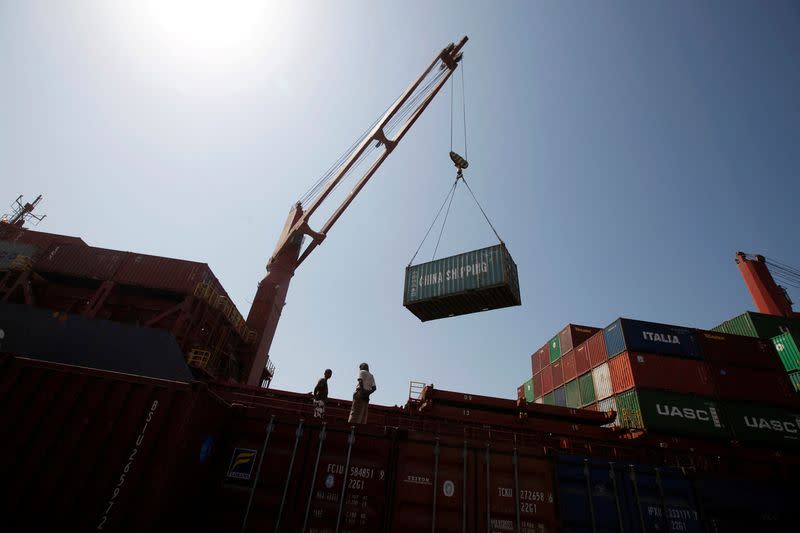Freight rates for ocean cargo have soared after an attempted attack on Wednesday and a bid to hijack a Maersk ship last Sunday forced shipping companies to suspend plans to restart transits through the Red Sea.
Yemen-based Houthi militants have launched more than 20 attacks on cargo ships in the Red Sea over the past two months in a show of support for Hamas, the Palestinian group fighting Israel in Gaza.
This has forced ships to reroute around the southern tip of Africa, doubling the cost of cargo going from Asia to Northern Europe because vessels can no longer go through the Suez Canal and must undertake a much longer voyage.
ALSO SEE: China’s Services Sector Sees Best Growth in 5 Months: Caixin
UNSC calls for Houthis to end attacks
Members of the UN Security Council, including China, called on Wednesday for the Houthis to halt their attacks on shipping in the Red Sea and Gulf of Aden, saying they are illegal and threaten regional stability, freedom of navigation and global food supplies.
Addressing the council’s first formal meeting of 2024, members also demanded that the Houthis release the Galaxy Leader, a Japanese-operated cargo ship linked to an Israeli company, and its crew, which the group seized on November 19.
Some members urged the council to take action to halt the Houthi missile and drone attacks. But the body took no formal steps in the open session before going into closed consultations.
The United States believes the situation has reached an “inflection point,” Chris Lu, a US representative to the United Nations, told the council.
“These attacks pose grave implications for maritime security, international shipping and commerce, and they undermine the fragile humanitarian situation in Yemen,” threatening aid deliveries to the war-torn country, Lu said.
US weighing strikes against Houthis
The Iran-aligned Houthis, who control much of Yemen, have launched drones and missiles at more than 20 ships since November 19, saying that in solidarity with Palestinians in Gaza, they were targeting vessels with Israeli links or were sailing to Israel.
But many vessels have had no Israeli connection and were not bound for Israeli ports, and major shipping lines have suspended their operations through the Red Sea.
Indeed, the attempted attack on a ship on Wednesday owned by French operator CMA CGM involved a ship sailing to Egypt, not Israel, rather than the “ports of occupied Palestine”, as claimed by a Houthi statement published on X (formerly Twitter). CMA AGM said their vessel was not damaged.
A dozen nations led by the United States issued a joint warning to the Yemeni rebels on Wednesday of unspecified consequences unless they immediately halt their attacks, because of increasingly disruption of global commerce.
The US said the statement was a final warning as the Biden Administration weighs possible military strikes against the Houthis if attacks persist.
Egypt’s Suez Canal connects the Red Sea to the Mediterranean Sea and is the fastest way to ship fuel, food and consumer goods from Asia and the Middle East to Europe. Shippers use the route to ferry as much as one-third of all global container cargo, including toys, tennis shoes, furniture and frozen food.
The attacks are already delaying delivery of products destined for numerous companies, as the Suez route is used by the likes of IKEA, Walmart and Amazon.
‘Spot’ rates doubling shipping costs
Asia-to-North Europe rates more than doubled to above $4,000 per 40-foot container this week, with Asia-to-Mediterranean prices climbing to $5,175, according to Freightos, a booking and payments platform for international freight.
Some carriers have announced rates above $6,000 per 40-foot container for Mediterranean shipments starting mid-month, and surcharges of $500 to as much as $2,700 per container could make all-in prices even higher, Judah Levine, Freightos’ head of research, said in an email.
As of Wednesday, hundreds of container ships and other vessels have been rerouted around Africa’s southern Cape of Good Hope to avoid the attacks – adding anywhere from seven to 20 days to their voyages.
Those so-called, one-time “spot” rates are roughly double the rates for freight that moves on the contract market, logistics executives said.
“People desperate to get space (on ships), are going to pay,” Christian Sur, executive vice president for ocean freight at Unique Logistics, said.
Rates to less-affected North American ports also are moving higher.
Up to 30% of cargo that arrives at the US east coast travels through the Suez Canal. Logistics executives expect some of those imports to be diverted to the US west coast – which is a straight shot across the Pacific Ocean from China and other Asian exporters.
Rates for shipments from Asia to North America’s East Coast climbed 55% to $3,900 per 40-foot container. West Coast prices jumped 63% to more than $2,700 ahead of expected cargo diversions to avoid Red Sea-related issues, Levine said.
While rates have spiked, they remain far below the record highs during the Covid pandemic of $14,000 per 40-foot containers going from Asia to North Europe and the Mediterranean and $22,000 for Asia to North America’s East Coast.
- Reuters with additional editing by Jim Pollard
ALSO SEE:
Shipping Firms Chart Return to Red Sea Amid US Military Push
Japanese Tanker Attacked Near India by Iranian Drone, US Says
Inflation Worries Mount as Exporters Hunt Ways Around Red Sea
Chinese Car Exports to EU Seen Hit by Red Sea Ship Attacks
Freight Firms Avoid Red Sea, Hitting Asia-Europe Supply Chains
























